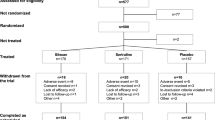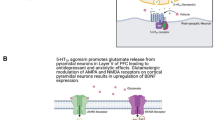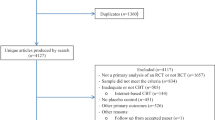Abstract
Bipolar disorder (BD) is one of the most potentially severe mental disorders. Literature data indicate that despite the current available treatments, a large proportion of patients do not achieve complete remission, with consequent residual symptoms and chronic impairment. We carried out a comprehensive review of new pharmacologic treatments for BD. Even though the core treatment of BD likely will not likely undergo substantial changes over the next few years, many promising results with respect to new augmentation strategies were identified. New treatments for bipolar depression and for BD-related cognitive impairment seem to represent particularly fertile areas of research.
Similar content being viewed by others
References
Papers of particular interest, published recently, have been highlighted as: • Of importance •• Of major importance
Calabrese JR, Hirschfeld RM, Reed M, Davies MA, Frye MA, Keck PE, et al. Impact of bipolar disorder on a U.S. community sample. J Clin Psychiatry. 2003;64(4):425–32.
Dean BB, Gerner D, Gerner RH. A systematic review evaluating health-related quality of life, work impairment, and healthcare costs and utilization in bipolar disorder. Curr Med Res Opin. 2004;20(2):139–54.
Pompili M, Rihmer Z, Innamorati M, Lester D, Girardi P, Tatarelli R. Assessment and treatment of suicide risk in bipolar disorders. Expert Rev Neurother. 2009;9(1):109–36.
• Parikh SV, LeBlanc SR, Ovanessian MM. Advancing bipolar disorder: key lessons from the Systematic Treatment Enhancement Program for Bipolar Disorder (STEP-BD).Can J Psychiatry. 2010;55(3):136–43. The authors carried out a summary and critical analysis of the main Systematic Treatment Enhancement Program for Bipolar Disorder findings.
•• Sanches M, Newberg AR, Soares JC. Emerging drugs for bipolar disorder. Expert Opin Emerg Drugs. 2010;15(3):453–66. In this review, we discuss some of the novel drugs currently being tested for the treatment of BD, with a focus on their mechanism of action.
Vieta E. Pharmacological management of manic episodes. In: Vieta E, editor. Bipolar disorder in clinical practice. London: Current Medicine Group Ltd; 2007. p. 69–80.
Dennehy EB, Suppes T, Rush AJ, Miller AL, Trivedi MH, Crismon ML, et al. Does provider adherence to a treatment guideline change clinical outcomes for patients with bipolar disorder? Results from the Texas Medication Algorithm Project. Psychol Med. 2005;35(12):1695–706.
Gao Y, Payne RS, Schurr A, Hougland T, Lord J, Herman L, et al. Memantine reduces mania-like symptoms in animal models. Psychiatry Res 2011 (in press).
Agarwal V, Tripathi A. Memantine in the management of a clinically challenging case of bipolar disorder. Indian J Psychiatry. 2009;51(2):137–8.
Koukopoulos A, Reginaldi D, Serra G, Koukopoulos A, Sani G, Serra G. Antimanic and mood-stabilizing effect of memantine as an augmenting agent in treatment-resistant bipolar disorder. Bipolar Disord. 2010;12(3):348–9.
Keck Jr PE, Hsu HA, Papadakis K, Russo Jr J. Memantine efficacy and safety in patients with acute mania associated with bipolar I disorder: a pilot evaluation. Clin Neuropharmacol. 2009;32(4):199–204.
DiazGranados N, Zarate Jr CA. A review of the preclinical and clinical evidence for protein kinase C as a target for drug development for bipolar disorder. Curr Psychiatry Rep. 2008;10(6):510–9.
Amrollahi Z, Rezaei F, Salehi B, Modabbernia AH, Maroufi A, Esfandiari GR, et al. Double-blind, randomized, placebo-controlled 6-week study on the efficacy and safety of the tamoxifen adjunctive to lithium in acute bipolar mania. J Affect Disord. 2011;129(1–3):327–31.
Yildiz A, Guleryuz S, Ankerst DP, Ongür D, Renshaw PF. Protein kinase C inhibition in the treatment of mania: a double-blind, placebo-controlled trial of tamoxifen. Arch Gen Psychiatry. 2008;65(3):255–63.
Zarate Jr CA, Singh JB, Carlson PJ, Quiroz J, Jolkovsky L, Luckenbaugh DA, et al. Efficacy of a protein kinase C inhibitor (tamoxifen) in the treatment of acute mania: a pilot study. Bipolar Disord. 2007;9(6):561–70.
Yildiz A, Vieta E, Leucht S, Baldessarini RJ. Efficacy of antimanic treatments: meta-analysis of randomized, controlled trials. Neuropsychopharmacology. 2011;36(2):375–89.
•• Yatham LN, Kennedy SH, Schaffer A, Parikh SV, Beaulieu S, O’Donovan C, et al. Canadian Network for Mood and Anxiety Treatments (CANMAT) and International Society for Bipolar Disorders (ISBD) collaborative update of CANMAT guidelines for the management of patients with bipolar disorder: update 2009. Bipolar Disord. 2009;11(3):225–55. This is an extensive review of the current FDA-approved and off-label treatments of BD, with specific guidelines targeting the different phases of the disease.
Shen CC, Bai YM, Su T-P. Comment to Dr. Yatham regarding tamoxifen listed as a third-line recommendation for the pharmacological treatment of acute mania. Bipolar Disord. 2009;11:773–5.
Machado-Vieira R, Soares JC, Lara DR, Luckenbaugh DA, Busnello JV, Marca G, et al. A double-blind, randomized, placebo-controlled 4-week study on the efficacy and safety of the purinergic agents allopurinol and dipyridamole adjunctive to lithium in acute bipolar mania. J Clin Psychiatry. 2008;69(8):1237–45.
Akhondzadeh S, Milajerdi MR, Amini H, Tehrani-Doost M. Allopurinol as an adjunct to lithium and haloperidol for treatment of patients with acute mania: a double-blind, randomized, placebo-controlled trial. Bipolar Disord. 2006;8(5 Pt 1):485–9.
Eden Evins A, Demopulos C, Nierenberg A, Culhane MA, Eisner L, Sachs G. A double-blind, placebo-controlled trial of adjunctive donepezil in treatment-resistant mania. Bipolar Disord. 2006;8(1):75–80.
O’Brien SM, Scully P, Scott LV, Dinan TG. Cytokine profiles in bipolar affective disorder: focus on acutely ill patients. J Affect Disord. 2006;90:263–7.
Brietzke E, Scheinberg M, Lafer B. Therapeutic potential of interleukin-6 antagonism in bipolar disorder. Med Hypotheses. 2011;76(1):21–3.
Citrome L. Iloperidone, asenapine, and lurasidone: a brief overview of 3 new second-generation antipsychotics. Postgrad Med. 2011;123(2):153–62.
Bersudsky Y, Applebaum J, Gaiduk Y, Sharony L, Mishory A, Podberezsky A, et al. Valnoctamide as a valproate substitute with low teratogenic potential in mania: a double-blind, controlled, add-on clinical trial. Bipolar Disord. 2010;12(4):376–82.
Kalinichev M, Dawson LA. Evidence for antimanic efficacy of glycogen synthase kinase-3 (GSK3) inhibitors in a strain-specific model of acute mania. Int J Neuropsychopharmacol. 2011 (In press).
Ketter TA. Nosology, diagnostic challenges, and unmet needs in managing bipolar disorder. J Clin Psychiatry. 2010;71(10):e27.
Sidor MM, Macqueen GM. Antidepressants for the acute treatment of bipolar depression: a systematic review and meta-analysis. J Clin Psychiatry. 2011;72(2):156–67.
Fountoulakis KN. Pharmaceutical treatment of acute bipolar depression. F1000 Med Rep. 2010;2:47.
Judd LL, Akiskal HS, Schettler PJ, Endicott J, Maser J, Solomon DA, et al. The long-term natural history of the weekly symptomatic status of bipolar I disorder. Arch Gen Psychiatry. 2002;59:530–7.
Diazgranados N, Ibrahim L, Brutsche NE, Newberg A, Kronstein P, Khalife S, et al. A randomized add-on trial of an N-methyl-D-aspartate antagonist in treatment-resistant bipolar depression. Arch Gen Psychiatry. 2010;67(8):793–802.
Zarate Jr CA, Quiroz JA, Singh JB, Denicoff KD, De Jesus G, Luckenbaugh DA, et al. An open-label trial of the glutamate-modulating agent riluzole in combination with lithium for the treatment of bipolar depression. Biol Psychiatry. 2005;57(4):430–2.
Brennan BP, Hudson JI, Jensen JE, McCarthy J, Roberts JL, Prescot AP, et al. Rapid enhancement of glutamatergic neurotransmission in bipolar depression following treatment with riluzole. Neuropsychopharmacology. 2010;35(3):834–46.
Berk M, Copolov DL, Dean O, Lu K, Jeavons S, Schapkaitz I, et al. N-acetyl cysteine for depressive symptoms in bipolar disorder—a double-blind randomized placebo-controlled trial. Biol Psychiatry. 2008;64(6):468–75.
Magalhães PV, Dean OM, Bush AI, Copolov DL, Malhi GS, Kohlmann K, et al. N-acetyl cysteine add-on treatment for bipolar II disorder: a subgroup analysis of a randomized placebo-controlled trial. J Affect Disord. 2011;129(1–3):317–20.
Dean O, Giorlando F, Berk M. N-acetylcysteine in psychiatry: current therapeutic evidence and potential mechanisms of action. J Psychiatry Neurosci. 2011;36(2):78–86.
Fornaro M, Prestia D, Colicchio S, Perugi G. A systematic, updated review on the antidepressant agomelatine focusing on its melatonergic modulation. Curr Neuropharmacol. 2010;8(3):287–304.
Calabrese JR, Guelfi JD, Perdrizet-Chevallier C, Agomelatine Bipolar Study Group. Agomelatine adjunctive therapy for acute bipolar depression: preliminary open data. Bipolar Disord. 2007;9(6):628–35.
Furey ML, Drevets WC. Antidepressant efficacy of the antimuscarinic drug scopolamine: a randomized, placebo-controlled clinical trial. Arch Gen Psychiatry. 2006;63(10):1121–9.
Nery FG, Monkul ES, Hatch JP, Fonseca M, Zunta-Soares GB, Frey BN, et al. Celecoxib as an adjunct in the treatment of depressive or mixed episodes of bipolar disorder: a double-blind, randomized, placebo-controlled study. Hum Psychopharmacol. 2008;23(2):87–94.
El-Mallakh RS, Penagaluri P, Kantamneni A, Gao Y, Roberts RJ. Long-term use of pramipexole in bipolar depression: a naturalistic retrospective chart review. Psychiatr Q. 2010;81(3):207–13.
Perugi G, Toni C, Ruffolo G, Frare F, Akiskal H. Adjunctive dopamine agonists in treatment-resistant bipolar II depression: an open case series. Pharmacopsychiatry. 2001;34(4):137–41.
Goldberg JF, Frye MA, Dunn RT. Pramipexole in refractory bipolar depression. Am J Psychiatry. 1999;156(5):798.
Goldberg JF, Burdick KE, Endick CJ. Preliminary randomized, double-blind, placebo-controlled trial of pramipexole added to mood stabilizers for treatment-resistant bipolar depression. Am J Psychiatry. 2004;161(3):564–6.
Zarate Jr CA, Payne JL, Singh J, Quiroz JA, Luckenbaugh DA, Denicoff KD, et al. Pramipexole for bipolar II depression: a placebo-controlled proof of concept study. Biol Psychiatry. 2004;56(1):54–60.
Mah L, Zarate Jr CA, Nugent AC, Singh JB, Manji HK, Drevets WC. Neural mechanisms of antidepressant efficacy of the dopamine receptor agonist pramipexole in treatment of bipolar depression. Int J Neuropsychopharmacol. 2011;14(4):545–51.
Drevets WC. Orbitofrontal cortex function and structure in depression. Ann N Y Acad Sci. 2007;1121:499–527.
Frye MA, Grunze H, Suppes T, McElroy SL, Keck Jr PE, Walden J, et al. A placebo-controlled evaluation of adjunctive modafinil in the treatment of bipolar depression. Am J Psychiatry. 2007;164(8):1242–9.
Kumar R. Approved and investigational uses of modafinil: an evidence-based review. Drugs. 2008;68(13):1803–39.
Calabrese JR, Ketter TA, Youakim JM, Tiller JM, Yang R, Frye MA. Adjunctive armodafinil for major depressive episodes associated with bipolar I disorder: a randomized, multicenter, double-blind, placebo-controlled, proof-of-concept study. J Clin Psychiatry. 2010;71(10):1363–70.
Wolf J, Fiedler U, Anghelescu I, Schwertfeger N. Manic switch in a patient with treatment-resistant bipolar depression treated with modafinil. J Clin Psychiatry. 2006;67(11):1817.
Ranjan S, Chandra PS. Modafinil-induced irritability and aggression? A report of 2 bipolar patients. J Clin Psychopharmacol. 2005;25(6):628–9.
Saricicek A, Maloney K, Muralidharan A, Ruf B, Blumberg HP, Sanacora G, et al. Levetiracetam in the management of bipolar depression: a randomized, double-blind, placebo-controlled trial. J Clin Psychiatry. 2011 (in press).
Kraguljac NV, Montori VM, Pavuluri M, Chai HS, Wilson BS, Unal SS. Efficacy of omega-3 fatty acids in mood disorders—a systematic review and metaanalysis. Psychopharmacol Bull. 2009;42(3):39–54.
Brown ES, Bobadilla L, Rush AJ. Ketoconazole in bipolar patients with depressive symptoms: a case series and literature review. Bipolar Disord. 2001;3(1):23–9.
Chaves OC, Lombardo LE, Bearden CE, Woolsey MD, Martinez DM, Barrett JA, et al. Association of clinical symptoms and neurocognitive performance in bipolar disorder: a longitudinal study. Bipolar Disord. 2011;13(1):118–23.
•• Goldberg JF, Chengappa KNR. Identifying and treating cognitive impairment in bipolar disorder. Bipolar Disord. 2009;11 Suppl. 2:123–13. This is a comprehensive review on the clinical, pathophysiologic, and therapeutic aspects of the cognitive impairment seen in BD.
Kelly T. Is donepezil useful for improving cognitive dysfunction in bipolar disorder? J Affect Disord. 2008;107(1–3):237–40.
Gildengers AG, Butters MA, Chisholm D, Reynolds CF, Mulsant BH. A 12-week open-label pilot study of donepezil for cognitive functioning and instrumental activities of daily living in late-life bipolar disorder. Int J Geriatr Psychiatry. 2008;23(7):693–8.
Ghaemi SN, Gilmer WS, Dunn RT, Hanlon RE, Kemp DE, Bauer AD, et al. A double-blind, placebo-controlled pilot study of galantamine to improve cognitive dysfunction in minimally symptomatic bipolar disorder. J Clin Psychopharmacol. 2009;29(3):291–5.
Iosifescu DV, Moore CM, Deckersbach T, Tilley CA, Ostacher MJ, Sachs GS, et al. Galantamine-ER for cognitive dysfunction in bipolar disorder and correlation with hippocampal neuronal viability: a proof-of-concept study. CNS Neurosci Ther. 2009;15(4):309–19.
Teng CT, Demetrio FN. Memantine may acutely improve cognition and have a mood stabilizing effect in treatment-resistant bipolar disorder. Rev Bras Psiquiatr. 2006;28(3):252–4.
Young AH, Gallagher P, Watson S, Del-Estal D, Owen BM, Ferrier IN. Improvements in neurocognitive function and mood following adjunctive treatment with mifepristone (RU-486) in bipolar disorder. Neuropsychopharmacology. 2004;29(8):1538–45.
Miskowiak KW, Vinberg M, Harmer CJ, Ehrenreich H, Knudsen GM, Macoveanu J, et al. Effects of erythropoietin on depressive symptoms and neurocognitive deficits in depression and bipolar disorder. Trials. 2010;11:97.
Naylor GJ, Martin B, Hopwood SE, Watson Y. A two-year double-blind crossover trial of the prophylactic effect of methylene blue in manic-depressive psychosis. Biol Psychiatry. 1986;21(10):915–20.
Michalak EE, Murray G, Young AH, Lam RW. Burden of bipolar depression: impact of disorder and medications on quality of life. CNS Drugs. 2008;22(5):389–406.
Pompili M, Venturini P, Innamorati M, Serafini G, Telesforo L, Lester D, et al. The role of asenapine in the treatment of manic or mixed states associated with bipolar I disorder. Neuropsychiatr Dis Treat. 2011;7:259–65.
Al Jurdi RK, Dixit LA, Sajatovic M. Role of extended release quetiapine in the management of bipolar disorders. Neuropsychiatr Dis Treat. 2010;6:29–35.
Stahl SM. The Prescriber’s Guide. New York: Cambridge University Press; 2009.
Strakowski SM. Approaching the challenge of bipolar depression: results from STEP-BD. Am J Psychiatry. 2007;164:1301–3.
Acknowledgment
Dr. Soares has received grant support from the National Institutes of Health.
Disclosure
Dr. Sanches has served on the speakers’ bureau for AstraZeneca and had travel/accommodations expenses covered/reimbursed by H. Lundbeck A/S.
Dr. Soares has received research grant support from Pfizer, GlaxoSmithKline, Bristol-Myers Squibb, Forest Laboratories, and Repligen Corp.; served on speakers’ bureaus for Eli Lilly and Company and AstraZeneca; and served on a board for DBSA Houston.
Author information
Authors and Affiliations
Corresponding author
Rights and permissions
About this article
Cite this article
Sanches, M., Soares, J.C. New Drugs for Bipolar Disorder. Curr Psychiatry Rep 13, 513–521 (2011). https://doi.org/10.1007/s11920-011-0231-1
Published:
Issue Date:
DOI: https://doi.org/10.1007/s11920-011-0231-1




